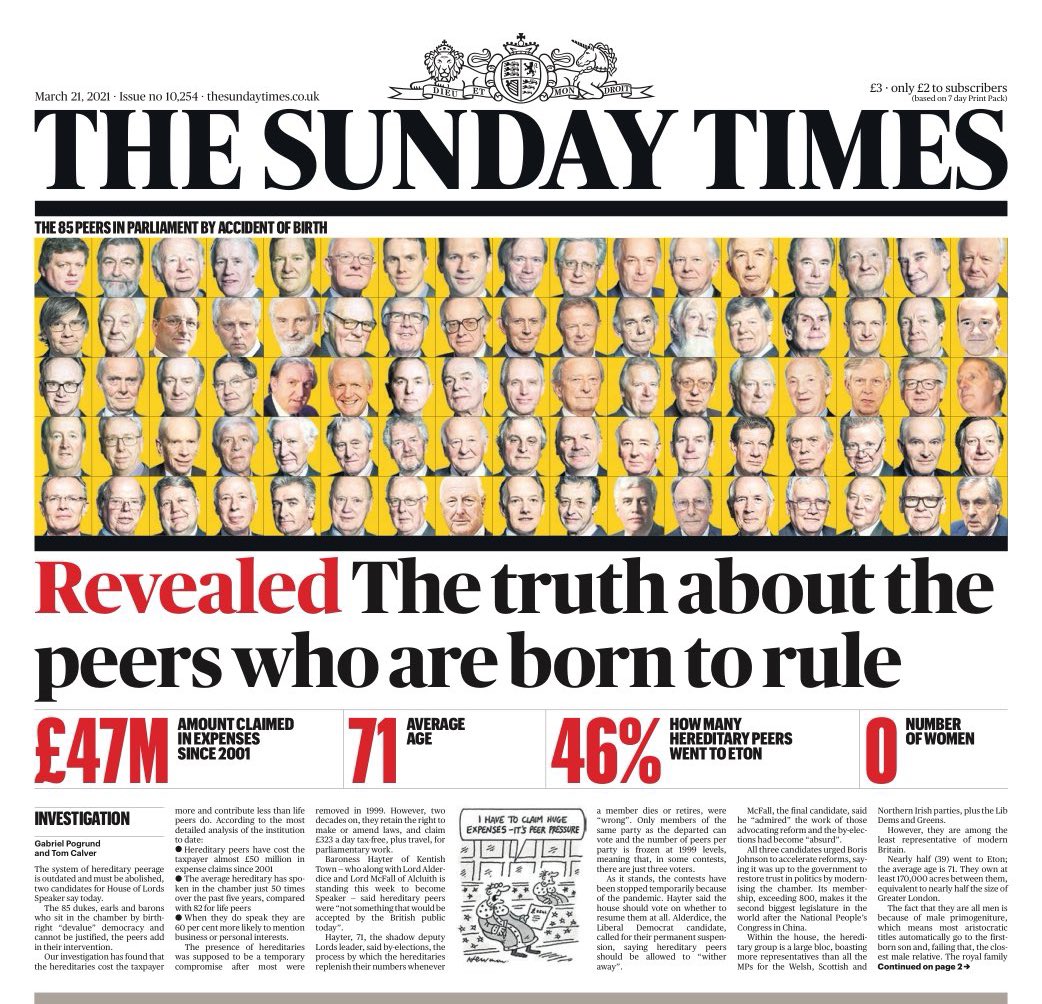ctd.
Not all peers live up to the grandeur of their titles. In a newspaper article, the Duke of Somerset’s lover said the 68-year-old spent his days “sitting at home in moth-eaten jumpers eating a ready meal for one”. But his is no ordinary home: he owns the 17th-century Bradley House in Wiltshire, built on land given to his family by Henry VIII. The woman speaking was a socialite 21 years his junior, whom he had befriended on a pheasant shoot.
WHAT DO THEY DO?
Lord Brabazon of Tara, 74, grandson of Churchill’s aircraft production minister, did not expect to be in the chamber for decades. In 2017, he told colleagues: “When I was elected in 1999, I never supposed I would still be here 18 years later.”
As a peer, he is entitled to cut-price alcohol and subsidised food at the peers’ dining room, once called the “best day care centre for the elderly in London”. He can also claim travel expenses and a £323 daily allowance for taking part in parliamentary proceedings. These payments are tax free. What does the taxpayer get in return? Brabazon was a whip under Thatcher and deputy Lords Speaker from 2010-12.
He claimed £30,361 in expenses last year, equal to the average full-time, pre-tax salary. Brabazon did not take part in a single debate in parliament.
Some hereditaries say they are among the most active members of the Lords and are working peers, not shirking peers. Indeed Brabazon acknowledges that: “I do not speak in the chamber often [as it is] very difficult to get in at question time for instance”, but says he plays a full part sitting on a Lords committee. However, an analysis of all lords who have sat in the chamber for the past five years shows hereditary peers generally contribute less but cost more.
Hereditaries claimed £144,000 on average in that time, compared with £134,000 for life peers. The typical hereditary peer made 50 speeches in the chamber compared with 82 among life peers. Hereditary peers asked half as many written questions to ministers. Just 13 per cent sit on two or more committees for scrutinising legislation, compared with 20 per cent of life peers. More than half, 45, of hereditaries do not sit on any.
In the past 20 years hereditary peers have claimed £47 million in expenses from the taxpayer. Had some peers saved all of their allowances over the past two decades, they would be millionaires. Lord Addington, who became the youngest-ever hereditary peer, aged 22, in 1986, has been paid more than £974,000 in tax-free expenses since 2001 when parliamentary records began.
WHO DO THEY REPRESENT?
Expenses are not the only source of income for hereditary peers. Many make money lobbying in parliament for private interests, including oil, tobacco and foreign states.
Lord Palmer, 69, heir to a biscuit empire founded by his great-grandfather, has become a dependable representative for the tobacco industry. Palmer, who once said he was expelled from Eton because he was “so incredibly stupid”, has been a smart investment for tobacco companies. According to his register of interests, Palmer is convenor of the Lords and Commons Cigar Club, a secretive group, bankrolled by the Tobacco Manufacturers’ Association. His family business was sold to RJ Reynolds Tobacco Company, a subsidiary of British American Tobacco, the world’s biggest tobacco company, where he is a shareholder.
Palmer, a cigar smoker, has consistently been a voice for lax regulation on cigarettes. In a 2011 debate on tobacco advertising he said if “smoking was completely outlawed, the entire British economy would literally collapse”. He has called on ministers to reverse a ban on small cigarette packs, saying it has a “devastating impact on small local shops”. Palmer has claimed £936,000 in expenses since 2001. If a peer wants to raise a matter in the chamber that relates to their private interests, they must either disclose for whom they work or refer colleagues to the register of interests. In practice this gives lords a carte blanche to lobby in the chamber.
An analysis of Hansard over the past five years suggests that hereditary peers are 60 per cent more likely to refer to this register when they speak, compared with life peers. Many peers are patrons of charities or sit on the boards of public institutions, such as universities. But a large number of the interests raised concern two commodities that are in plentiful supply among the hereditaries. The first is land: 30 per cent of hereditary peers (26) receive farming payments from the EU, which, last financial year, totalled £2.7 million. These members have become some of the most vocal advocates for post-Brexit subsidies.
The second is outside jobs. Take Viscount Waverley: the grandson of Churchill’s wartime chancellor, who has business interests in the former Soviet Union. Waverley, 71, has repeatedly questioned the value of sanctions against Russia in the chamber, saying they were “mostly hurting the more fair-minded western-oriented Russians”.
In 2018, after the Salisbury poisonings, he met Putin’s deputy foreign minister in St Petersburg to sign a “co-operation agreement” between his private consultancy and Roscongress, the Russian trade body. Despite warnings from the Foreign Office, Waverley met the Speaker of the Russian state assembly to discuss trade and interparliamentary ties. He said the appropriate authorities were informed.
Lord Carrington, 72, is the son of Thatcher’s foreign secretary and a descendant of a slave owner. The peer, a former banker, is the director of a Saudi company that has built oil refineries and previously oversaw Saudi investments for a merchant bank. He has repeatedly spoken about the kingdom in the chamber but emphasised business and trade rather than human rights. He used a debate on arms sales last year to raise the issue of “seriously” late payments from Saudi businesses.
Then, months after the murder of the journalist, Jamal Khashoggi, he responded to a government statement on executions in Saudi Arabia, saying: “I caution the government that the alternative to the current royal government ... could be considerably worse.”
Waverley, who owns several farms, has submitted written questions about one issue: farming — including state subsidies. He said last night he only speaks on subjects on which he has “long experience and deep personal knowledge ... I am not certain that my contributions on matters in which I had little knowledge would be particularly valuable!”
WHAT CAN BE DONE?
On Tuesday the Lords will announce the candidates competing to be the next Speaker. Change seems to be in the air.
The departing Speaker, Lord Fowler, 83, has been an outspoken advocate for a much smaller chamber.The Lords, with about 800 sitting members, is the second biggest legislative body in the world after China’s National People’s Congress.
The idea of modernising the Lords has gained momentum. Boris Johnson has toyed with moving the chamber to northern England to advance his levelling-up agenda. Others believe it should be transformed into a senate-like chamber, to help stave off Scottish independence. The position of all main parties is that the chamber size must be cut. What is up for debate is how and when that is achieved.
Hereditary peers are likely to form part of the answer. Since the start of the pandemic last March, their by-elections have been repeatedly suspended, meaning four departed members have not been replaced. This has led many to whisper: what if the contests are simply never resumed? It is an idea that gains traction today, with three candidates to succeed Fowler expressing some form of support.
Lord Alderdice, 65, a Liberal Democrat peer, says by-elections should be paused indefinitely, allowing hereditary peers to “wither away”.
Baroness Hayter of Kentish Town, 71, Labour’s deputy leader in the Lords, says its work is “devalued” by the hereditaries. “The idea of only having people in because of what an antecedent did, rather than what they themselves did, is not something that would be accepted by the British public today.”
The final candidate, Lord McFall of Alcluith, a former Labour MP and deputy Lords’ Speaker, says he “admires” the work of Lord Grocott who has repeatedly tabled bills to end the by-election system.
For now, though, hereditary peers will adopt the philosophy of Lord Borwick, 66. Not long ago, he told the chamber: “Do I deserve this place? Absolutely not! Am I grateful that I’ve got it? Absolutely! And I hope that I’ve been working hard enough to reckon that other people might think I deserve it.”
THE OLDEST PEER
Lord Denham, 93
The longest-serving member of the Lords, he is one of a handful of politicians to have served in the governments of five prime ministers. Educated at Eton and King’s College, Cambridge, he inherited his title on the death of his father in 1948. He held government posts under Harold Macmillan, Alec Douglas-Home, Ted Heath, Margaret Thatcher and John Major, also finding time to write four political mystery novels under the name Bertie Denham. He has claimed £63,000 in allowances for attending the Lords since 2015 but last spoke in the chamber in July 2014. The title was created in 1937 for his father, a Tory MP for Buckingham and a former Lords chief whip.
THE OLDEST PEERAGE
Lord Willoughby de Broke, 82
The Latimer barony has existed since 1290, but as with many hereditary peers, the incumbent, the 29th holder, holds other titles. His preferred one, Lord De Broke, stems from a centuries- old spelling error. Henry VII rewarded his military commander, Robert Willoughby, with an hereditary peerage in 1492, named after Brook, his Wiltshire home. A little more than 500 years later, the title regained prominence when the current baron became leader of Ukip in the Lords. He has since fallen out with the party, reportedly over its alliance with Tommy Robinson, but remains a Brexiteer despite having received £106,150 in EU subsidies for his 927-acre arable and grouse farm in Warwickshire.
THE RICHEST PEER
Lord Granchester, 82
He may be the only hereditary peer to grace the Sunday Times Rich List, with a fortune of £1.2 billion, but that has not stopped Christopher Suenson-Taylor from charging the taxpayer £583,000 in expenses since 2001. He is the grandson of John Moores, the former Everton FC owner and founder of the Littlewoods football pools and retail empire. Grantchester still has an 8 per cent stake in his beloved Toffees. He is a dairy farmer and owes his peerage to his other grandfather (on his father’s side, of course), Alfred Jesse Taylor, a First World War veteran and Liberal politician. He runs a 550-acre dairy farm in Crewe, which received handsome EU farming subsidies of £57,974 in 2019.
INTERESTS RAISED
Duke of Wellington, 75
Some peers have primarily spoken in the chamber in order to discuss issues relating directly to their financial or personal interests. One of them is the Duke of Wellington: nearly all of his interventions have required him to declare an interest in accordance with the rules. For example, the landowner and farmer has frequently weighed on readings of the latest Agriculture Bill, including arguing for “extra payments for nature-friendly farming practices”. Educated at Eton and Christ Church, Oxford, he made a fortune in finance: he was a director of Rothmans and chairman of Dunhill. Elevated to the Lords in 2015, he quit the Tory group to sit as a non-affiliated peer in 2019 as the Brexit debate raged.
THE QUIETEST
Earl of Stair, 59
There was stiff competition in the race for the quietest Lord, but the Earl of Stair is right up there. He last spoke in the chamber in an armed services debate in 2016. Since rejoining the chamber through a by-election in 2008, he has never submitted a written question and has spoken in the chamber only ten times, yet has claimed more than £170,000 in expenses. The Scottish Stairs are linked by marriage to the Bowes-Lyon family of the late Queen Mother. The 14th earl was educated at Harrow and inherited his title in 1996 on the death of his father, who competed in the bobsleigh event in the 1928 Winter Olympics. His home is Stair Estate, which has 44,000 acres near Dumfries and Galloway.
THE MOST ECCENTRIC
Earl of Erroll, 72
Not many British peers can claim to be related to both King Pharnabazus, ruler of the Iberians in the fourth century BC; and Ersabet Bathory, a 17th-century Hungarian mass-murderer nicknamed “Countess Dracula”. The Eton and Cambridge-educated earl is the son of Sir Iain Moncreiffe of that Ilk, chief of the clan Moncreiffe, and Diana Hay, the 23rd Countess of Erroll, who was born in Kenya amid the aristocratic excesses of the so-called Happy Valley set renowned in the 1920s for its drug use and promiscuity. The 24th earl, a computer security consultant, runs a private club called Puffin’s, open only to members whose families fought — “or would have had they been there” — at the Battle of Flodden in 1513.
Reform sabotaged by two peers who have sat in chamber for 109 years
Twice in the past four years an attempt to reform the system of hereditary peers has been stymied, writes Tom Calver.
Bruce Grocott, 80, a Labour peer and trade unionist, has tried to use a private member’s bill to scrap hereditary peerage by-elections.
Under his plan, whenever a hereditary peer dies, resigns or is expelled from the House of Lords, they would not be replaced, which would leave the present system to wither away.
Why hasn’t it passed?
has tabled the bill three times in the past four sessions of parliament. However, only the government can ensure there is enough time for a bill to be debated and passed in the face of procedural challenges.
Who keeps killing off reform?
That brings us to two Conservative hereditary peers, Lord Trefgarne, 79, and the Earl of Caithness, 73, who have both sat in the chamber since they were 21 and have a combined length of service of 109 years. They have used parliamentary tactics to sabotage Grocott’s bills. These include wrecking amendments, in which an excessive number of amendments are tabled, leading to endless debates. On one occasion, the two peers tabled 50 such amendments. Without government support, Grocott’s bills have repeatedly run out of time.
Could it win enough votes to pass?
Many peers believe the Lords would vote by a clear majority to scrap by-elections if the bill was put to a conclusive vote. Lord Alderdice, the Lib Dem peer standing as Lords Speaker, says “the overwhelming majority” favours abolishing by-elections — including many hereditary peers themselves. One of them is Earl Clancarty, 68, a self-employed artist and translator who favours an elected senate. But many hereditary peers with similar opinions will not voluntarily leave the chamber until they know what is coming next — and that everyone is leaving with them.
What happens next?
The current session of parliament began after the last general election in December 2019. Peer s such as Lord Grocott must submit their bills to a ballot if they want them to be debated. There is no guarantee when, or whether, they will come before the house. Last time round, Grocott’s was allocated sixth place on the list of private member’s bills. That means it received its second reading, the most important stage, last year. Since March, however, no time has been made available for private member’s bills, because of Covid-19. When the government unveils the next Queen’s speech, there will be a new session and Grocott will be free to put his bill in the ballot once again.



